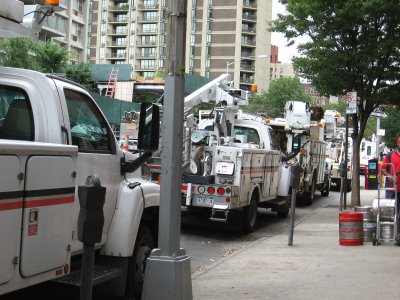One of our stations relies on a T-1 (DS-1) to relay audio from the studio to the transmitter site (STL). This station started as a piece of paper, with no format, no staff, no real estate, and no studio equipment. There was a transmitter and an antenna installed on a leased tower site.
That being said, corners were forcibly cut. Instead of installing a microwave STL system, a T-1 was ordered because we had a T-1 multiplexor. Fast forward several years… The station is now successful, making a decent amount of money and having a popular format.
The station has two T-1 circuits on different cables with an automatic switcher. Yesterday afternoon, the inevitable happened, both T-1s went out, along with most of the other TELCO circuits in the surrounding area. A construction crew cut two 3600-pair cables a mile down the road. The TELCO is racing to restore the service to all of the tenants on that tower by rigging a temporary aerial cable.
 Now the mad scramble ensues with conflicting requirements from the wacky program director. Screw it, I grabbed one of the AudioVault express machines and took it to the transmitter site. They are back on the air with a radio station in a box playing music until the T-1 gets fixed.
Now the mad scramble ensues with conflicting requirements from the wacky program director. Screw it, I grabbed one of the AudioVault express machines and took it to the transmitter site. They are back on the air with a radio station in a box playing music until the T-1 gets fixed.
This site has had numerous problems since we have owned it. In the 5 years since we launched the format, there have been six T-1 outages longer than 24 hours. For backup, we have tried an ISDN line, a 3G wireless card in a computer, and a second T-1 circuit. None of these have proved reliable as most circuit outages involved a cable cut, and multiple circuits were affected.
The real solution is a microwave STL, either a conventional 950 mHz system or a 2.4 or 5.8 gHz last mile system. Either would work better than what we have now. Station ownership, they don’t want to hear it.
Update: This took until Friday, September 4th to repair, for a total outage of 9 days, 2 hours, and 26 minutes. During that time, the station remained on the air with the AudioVault server at the transmitter site and the program director updating it twice per day with voice tracks and commercials.
